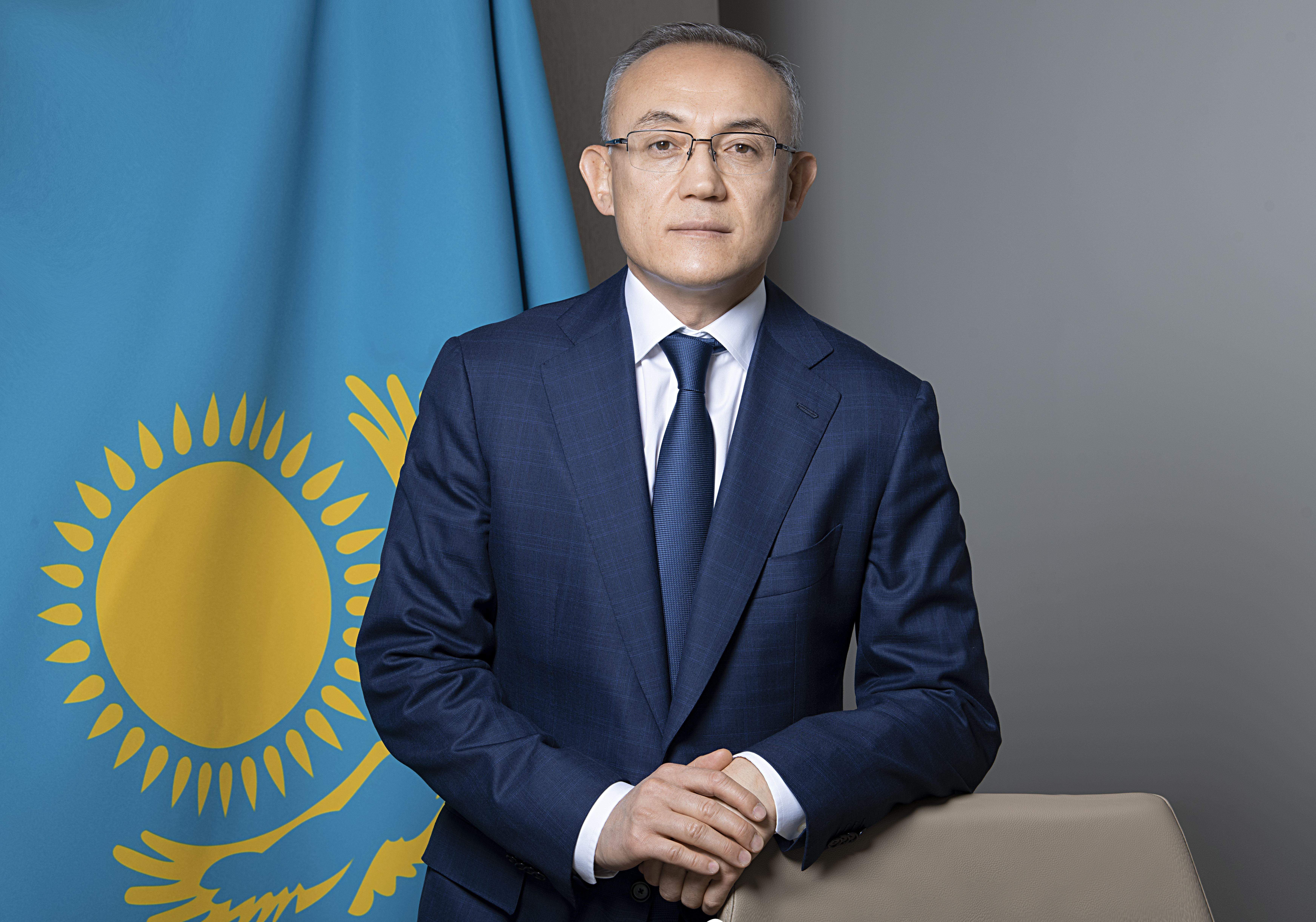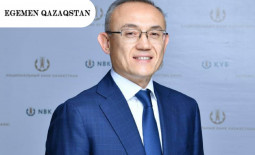The National Bank Governor comments on the main outcomes of 2022 and future plans
Interview for Egemen Qazaqstan
In another exclusive interview, the Governor of the National Bank Galymzhan Pirmatov talks about the main macroeconomic challenges and the outcomes of the past year. We talked about inflation forecasts, measures for lending to the economy, prospects for transition to digital tenge. The head of the National Bank also shared his vision on the regulator’s priorities for the upcoming year.
– Mr. Pirmatov, the economy and financial sector of Kazakhstan faced an unprecedented shock in 2022. Deterioration of the macroeconomic situation against the background of geopolitical uncertainty and increasing inflation affected all countries. What measures has the National Bank taken to ensure stability of the financial system of Kazakhstan?
– In 2022, the economy and financial sector of Kazakhstan faced an unprecedented shock and moved forward under conditions of high uncertainty. At the beginning of the year, the geopolitical situation was also difficult. And now we see that the direction and measures we took then were correct. Actions aimed at maintaining the stability of the country’s financial system were carried out in a timely manner.

To ensure price stability, the National Bank had to shift to monetary policy tightening. The base rate was raised from 10.25% in January to 16.75% in December 2022. These actions are aimed at stabilizing inflation processes in the medium term and slowing down inflation expectations in 2023.
As the base rate was increased, the rates on the retail deposits in tenge increased. In addition, a Program for protection of tenge deposits is being implemented by the NBK jointly with the Government. The measures taken made it possible to prevent the decrease of tenge deposits of population, stabilize the funding base of second-tier banks, reduce dollarization and pressure on the exchange rate.
Thus, dollarization of deposits decreased from 38.4% in February to 34.2% in November, and deposits in October, 2022, reached a historic maximum of 30.0 trillion tenge. With an increase of interest in tenge assets, the population shifts from consumption to savings behavior. This helps reduce inflationary pressure.
To this end, the National Bank together with the Government has developed a set of measures to control and reduce inflation for 2022–2024. It includes systemic measures such as increasing production volumes, developing logistics of goods and transport, antimonopoly regulation, etc.
– External shocks at the beginning of 2022 also led to sharp fluctuations in the domestic foreign exchange market. What measures has the National Bank taken to stabilize the situation with the exchange rate of tenge against the dollar and ruble?
– Aggravation of the geopolitical situation and deterioration of external environment negatively influenced the exchange rate dynamics. The March exchange rate reached above 500 tenge per US dollar. In such difficult conditions, we have taken prompt measures aimed at ensuring stability of the financial system. In February and March, foreign exchange interventions amounting to about $1.3 billion were carried out, while the share of mandatory sale of foreign exchange earnings of the quasi-public sector was increased from 50% to 75%. The decree of the Head of State also timely banned the export of foreign currency in cash in a timely manner.
Then, from April to December 2022 the National Bank did not conduct any interventions.
The measures taken made it possible to stabilize the situation on the foreign exchange market and ensure its normal functioning during the crisis. Currently, the foreign exchange market can be characterized as balanced. The tenge exchange rate is formed under the influence of market conditions, depending on the balance of supply and demand of market participants.
– How does the National Bank carry out President Tokayev’s assignment to ensure stable and affordable lending to the real sector?
– Together with the Government, the ARDFM and the Association of Financiers of Kazakhstan, the National Bank proposed a set of measures that were supported by the Head of State. One of them is liberalization of the turnover of subsoil and land use rights. It is planned to reduce the burden on banks and borrowers by canceling the licensing procedure for participation in auctions, except for strategic facilities. Thus, this initiative should facilitate the process of issuing loans by banks. It will also contribute to the development of market mechanisms.
In addition, it was proposed to introduce the institute of grain receipts with a state guarantee and digitalization of the process. Another effective measure that will allow banks to issue long-term loans is the expansion of opportunities for private investment management companies to participate in the management of pension assets.
– These are the support measures rather for large businesses and exporters. Are there any support mechanisms for SMEs?
– One of the important measures is the digitalization of the lending process for small and medium-sized businesses. Currently, integration of the state database of banks and the State Credit Bureau is underway. Temporary but effective measures are also being introduced to simplify lending to small and medium-sized businesses: reducing the working capital requirements of the borrower, simplifying the requirements for the collateral policy of banks, simplifying the procedures for obtaining loans. All these norms are temporary and will be returned to the levels set by the Basel Committee standards by 2024. In addition, it is planned to increase the duration of subsidizing the interest rate on loans issued under the ‘Economy of Simple Things’ program in priority sectors of the economy to 7 years. At the moment, all interested state bodies are working on the implementation of the proposed mechanisms.
I would like to note that despite the current difficulties, bank lending to the economy is also growing. At the end of November 2022, the loan portfolio of second-tier banks amounted to 22.2 trillion tenge. Banks issued quite a large amount of loans. Since the beginning of 2022, growth was amounted to 20.1%. Loans to legal entities also increased by 7.3% to 8.3 trillion tenge, including loans to small businesses – by 20.7%, to 4.5 trillion tenge. Consequently, the pace of money circulation in the economy has not slowed down. We can say that the situation is quite stable.
– In the outgoing year, it was also announced the possibility of transferring up to 50% of pension savings of Kazakhstanis to private management. What will this innovation bring for the citizens?
– This measure will allow the UAPF depositors to realize their right to choose investment strategies that meet their risk and profitability criteria. Conditions for the formation of an institutional competitive environment in the market of pension asset managers will improve, and the trust and involvement of depositors in the formation of future pensions will increase. In its turn, strengthening of competition in pension assets management will positively affect Kazakhstan’s securities market, increase its liquidity and efficiency. A real market environment will be formed, which will contribute to growth of income of all market participants.
It should also be taken into account that if depositors transfer their savings to private asset management companies, these savings will remain in the pension system and will be used for payments at retirement age.
– Kazakhstanis were excited to hear the news about the ‘National Fund for Children’ program. Could you share if the mechanism for implementing the program has been approved? Could you tell us about the terms, the main conditions and the order of opening children’s accounts?
– In accordance with the President’s Address, it is proposed to transfer 50% of investment income of the National Fund to special savings accounts without the right to withdraw it prematurely. When the child reaches the age of majority the accumulated sums may be used to acquire accommodation or get education.
Taking into consideration the need for careful study of this large-scale undertaking, it was instructed to launch the project on January 1, 2024. In this regard, all mechanisms for the implementation of this initiative are being developed by experts of the Government and the National Bank and are being discussed with the expert community. When specific mechanisms are approved, all of them, after passing the necessary procedures, will be presented to the public.
– For the National Bank, the year 2022 was full of events, and one of them was the presentation of the Digital Tenge pilot project. At what stage is the initiative to introduce the digital national currency now?
– On the instructions of the Head of State, in 2022 the National Bank conducted a comprehensive study on the need to introduce the national digital currency. In October, 2022, the technological platform of the digital tenge was successfully tested with real consumers and businesses.
The introduction of the digital tenge will be phased, in 3 phases by the end of 2025. In the first phase by the end of 2023, the possibility of using the digital tenge for social payments and public procurement will be implemented, scenarios for cross-border settlements and settlements in digital assets and decentralized finance will be tested, and the relevant legal and regulatory framework will be prepared.
In 2024, functional mechanisms for settlements in digital tenge without access to the Internet will be introduced. By 2025 it is planned to introduce the digital tenge into full commercial operation. This opens up great opportunities for the people of Kazakhstan. We believe that this project will create conditions in the financial market for innovative initiatives that will help increase financial inclusion.
– What priority tasks and challenges does the monetary regulator see for itself for the coming year and in the medium term?
– In the coming year, the main task for the National Bank of Kazakhstan, as well as for most of the world’s central banks, is to stabilize inflation. Therefore, work will continue on the implementation of the Monetary Policy Strategy 2030. This document is aimed at strengthening the foundations of monetary policy, developing the financial market and strengthening macroeconomic policy in general.
In addition, the flexible exchange rate policy will be continued. It helps to increase the efficiency of the foreign exchange market, prevent the accumulation of imbalances in the economy and preserve international reserves. The National Bank will also continue its work on the development of the domestic government securities market and the globalization of tenge and tenge assets, since building an efficient and liquid government debt market is an important component in ensuring the effectiveness of monetary policy.
One of the current priorities for the development of the government debt market is to increase the liquidity of the secondary market. Our initiatives will be aimed at improving the liquidity of government bonds and the inclusion of government securities in international indices, improving market pricing and increasing competition in the market as a whole.
– You became the Governor in 2022. What results have you summed up for yourself personally as the head of the National Bank?
– That’s a good question. For me personally, 2022 was a milestone year, a year of new challenges and opportunities. Yes, there are still many challenges, many plans, the situation is changing depending on what is going on both inside the country and on the geopolitical level. However, I repeat, all of our decisions are aimed at supporting the stability of the financial system and improving well-being of citizens. All macroeconomic decisions made by the regulator do not generally work overnight and begin to bear fruit in the medium term.
The National Bank possesses all tools and resources to take adequate measures to ensure financial and price stability in Kazakhstan. There is a big team of professionals working here.
It is also important to continue to pursue an open communication policy so that professional market participants and the general public have an understanding of what we are doing and how we are trying to provide it.
– And at the end of our interview, your wishes to our readers for the coming year.
– The main task of the National Bank is to protect welfare of population. Let the coming year bring the people of Kazakhstan wellbeing, financial stability, new opportunities and prospects. Also, I would like to note that in 2023 the country will mark an important anniversary date, 30 years since introduction of tenge. It is our national currency, the foundation of financial independence, and it has great potential.
Once again I wish every family health, prosperity and fulfilling year ahead. Happy New Year!
Source: Egemen Qazaqstan




